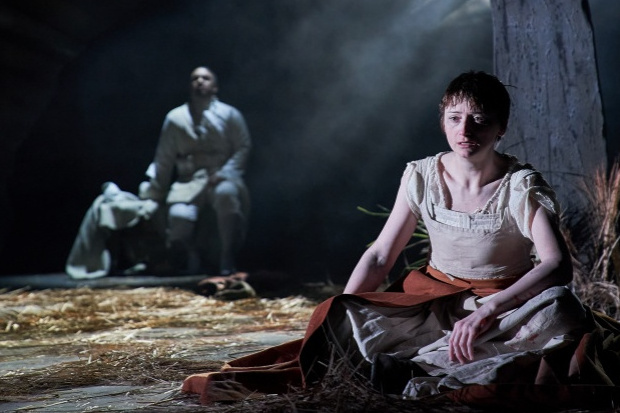
The original Faust myth, based on the historical person of Johann Faust, concerns a man who prefers earthly to religious knowledge and enters into a pact with the devil for unlimited knowledge and a fair dollop of earthly pleasure. Small surprise then that he has continued to be the inspiration of numerous artistic works. Indeed, there is much in contemporary life that can stand as metaphor for man’s arrogant affront to nature with powers he can barely control.
The opening scene in Chris Bush’s reworking, has Johanna Faustus’ mother being condemned to death for the charge of being a succubus in the employ of Lucifer and the playwright had us believing we were in for a revenger tragedy. Lucifer (Barnaby Power) appears overly keen to get his hands on Faustus’ soul and is prepared to do a bargain which indentures his henchman, Mephistopheles, to her scheme of avenging the death of her mother. (It did occur to me that in the interests of equality we could have had a female Lucifa, but that might have muddied the waters a little too much). Whilst that plot line is followed through it is not the only focus of Ms Bush’s interest.
Jodie McNee as Johanna Faustus, gives a performance of sustained, restless anger, fizzing with energy and with hardly a sentence not used as a weapon to bludgeon or goad. She is a time traveller railing against history for its treatment of women: Elizabeth Garrett Anderson and Marie Curie are amongst her acquaintances, though why she raises them from history is not clear, other than to remind us what a hard time women have traditionally had in achieving their potential as human beings. In her burning self-belief and righteous indignation, she is more than a match for her father, more than a match for Lucifer and a triumphant dominatrix to Mephistopheles.
Again in Faustus’ attempt to do some good by ending the plague in London, the unspoken lesson from Mephistopheles is, ’take care of what you wish for’, when he quenches the plague by an equally destructive fire. So the maxim which haunts her becomes a personal albatross as she longs for an end to life.
Danny Lee Wynter’s Mephistopheles is a charming and urbane fop who rankles under the authority of Johanna and has an air of indolence which suggests he’d rather be in the back row watching the perversions on the world stage than participating if it involved any effort.
The neat and uncluttered, barrel-vaulted set by Ana Inés Jabares-Pita is timeless without seeming surreal and functions well across time.
The ending has an ambiguity which suggests the events of the play have all been in her head, but the play fails to meet its potential by being over ambitious in its targets, trying to do too much and having little respite from the sustained rancour of the central character. ★★★☆☆ Graham Wyles 12th March 2020

